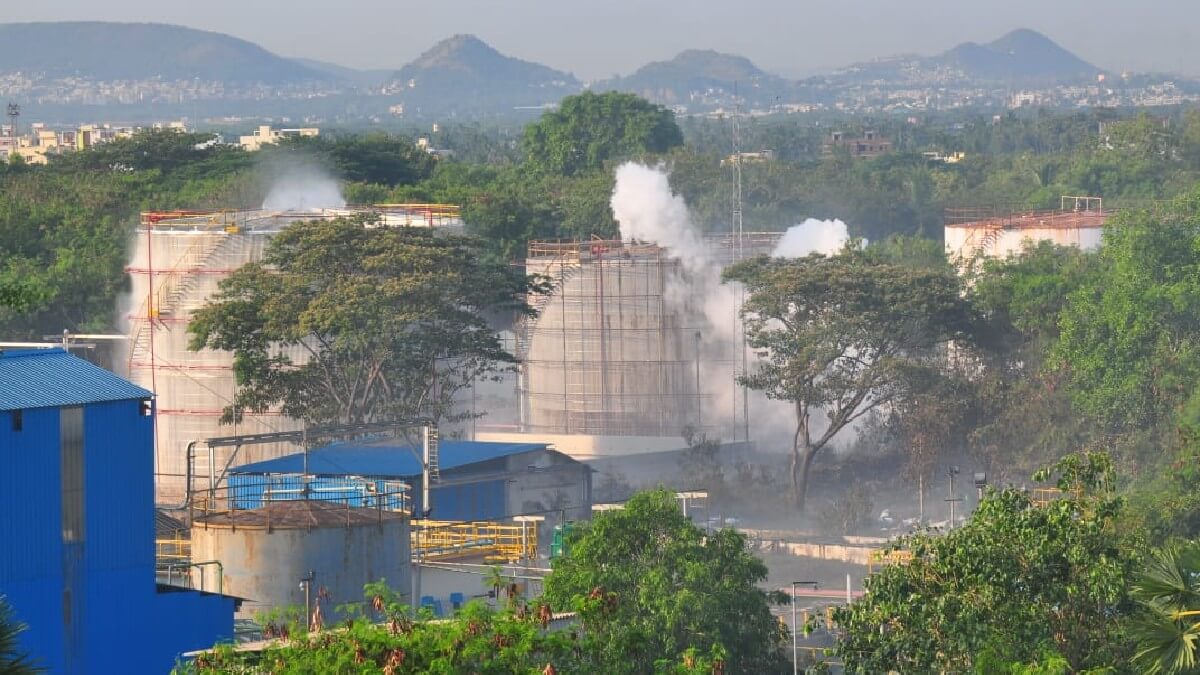In the early morning of 7 May, residents of the Gopalapatnam neighbourhood in Vishakapatnam (Vizag), a major port city in Andhra Pradesh, woke up to the horror of a major gas leak at 3:30 am. Till now, the chemicals from the leak have killed 11 people, while over 800 have been hospitalized and almost 5000 people have fallen ill from the emissions.
The leak, which occurred at the South Korea-owned LG Polymers chemical plant, is reportedly of a commonly-used gas called styrene, which is used in the plastic engineering industry. Styrene attacks the central nervous system of humans, damaging the body’s kidneys, gastrointestinal tract, respiratory system, eyes, and skin. Its immediate symptoms are dizziness and nausea, and those exposed to the gas can die if immediate medical help is not provided. In the long term, those who survive exposure to the gas may develop skin or blood cancer, and face developmental or reproductive problems, much like the victims of the 1984 Bhopal gas tragedy. There were also reports of cattle, birds, and trees dying from immediate exposure to the gas.
Styrene is not only poisonous, but also inflammable. Thankfully, however, there were no explosions triggered by the gas at the Vizag plant. Emergency services of the city acted quickly in evacuating more than 1500 people from villages surrounding the area, cordoning off a 3km radius around the plant. Officials from the National Disaster Response Force have started relief operations in 5 villages in the immediate vicinity of the plant, conducting door-to-door calls to investigate and help the affected. The Andhra Pradesh government has also introduced an emergency helpline for patients to contact medical authorities.
Andhra Pradesh Chief Minister YS Jagan Mohan Reddy has filed an inquiry into the leak and will be visiting hospitals in the area today. His government has also announced an INR 1 crore compensation package for those that lost their lives to the leak and INR 1 lakh to those who have been hospitalized. The district will be monitored for another 48 hours as emissions continue to spread. A resident from Vizag told Young Bhartiya that as of now, the leak has only affected the areas immediately surrounding the plant and emissions have not yet seeped into the city.
Prime Minister Narendra Modi tweeted, “I pray for everyone’s safety and well-being in Visakhapatnam,” assuring that the Centre will provide the state with all the necessary equipment and assistance. The Central government will be flying in specialized a CBRN team and other technical support from Pune to assist in containing the emissions.
The South Korean Ambassador to India, Shin Bong-kil, has also stated his shock and sadness upon hearing the news of the accident.
An FIR has been registered against LG Polymers for their negligence, and the company has said that the leak is under control. Sources say that employees were unable to maintain the 20-degree temperature needed to safely handle the gas tank due to the coronavirus-induced lockdown that rendered the plant closed for 40 days in peak summer heat.
BSS Prasad, Chairperson of the Andhra Pradesh Pollution Control Board, said that the liquid gas could have turned into vapour and leaked from the tank valve. Prasad also clarified that LG Polymers had obtained all the necessary permissions to operate its factory, and that there were no illegal practices or equipment inside the unit. He explained that the effects of the gas can be felt for up to 20 hours since the gas can only stay in air for 24 hours, after which it will dissolve. The Inspector of Factories is simultaneously conducting an investigation into the condition of the tank’s valve to assess its quality.
Hospitals in the affected district, which were already busy treating patients with COVID-19, now face a new challenge of immediately attending to victims of the gas leak.
Image Source: The Print
Tragic Gas Leak Hits India’s Vizag Amid Lockdown, Emergency Operations Underway
May 7, 2020

